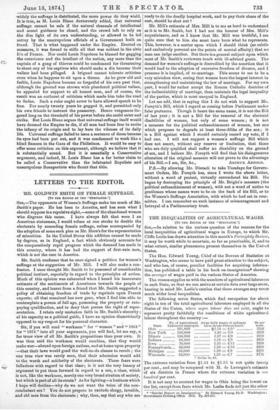LETTERS TO THE EDITOR.
MR. GOLDWIN SMITH ON FEMALE SUFFRAGE. [TO TIM EDITOR OF THE "SPECTATOR.")
SIR,—The opponents of Women's Suffrage make too much of Mr. Smith's paper. He has been to America, and has seen what I -should suppose is a repulsive sight,—some of the abandoned women who disgrace this cause. I have always felt that were I an American statesman, I would refuse at one stroke to double the electorate by conceding female suffrage, unless accompanied by the adoption of some such plan as Mr. Hare's for the representation of minorities. In the United States this addition cannot be made by degrees, as in England, a fact which obviously accounts for the comparatively rapid progress which the demand has made in this country, where it has had the support of first-rate men, which is not the case in America.
Mr. Smith confesses that he once signed a petition for women's suffrage at the suggestion of Mr. Mill. I will also make a con- fession. I once thought Mr. Smith to be possessed of considerable political instinct, especially in regard to the principles of action. Much of this opinion was exhausted when I heard his inaccurate estimate of the sentiments of Americans towards the people of this country, and learnt from a friend that Mr. Smith suggested a policy of obtaining freedom of trade by reprisals upon French exports; all that remained has now gone, when I find him able to -contemplate a person of full age, possessing the property or rate- paying qualification, and to deny that person the right of repre- sentation. I retain only unshaken faith in Mr. Smith's sincerity ; of his capacity as a political guide, I have an opinion diametrically opposed to my respect for his personal character.
Sir, if you will read " workmen " for " women " and " 1864 " for " 1874" into all your arguments, you will find, let me say, a far truer view of all Mr. Smith's propositions than your own. It was then said the workmen would combine, that they would make war—abroad upon foreign nations, and at home upon property —that their laws would goad the well-to-do classes to revolt ; the one true view was rarely seen, that their admission would add to the worth and solidarity of the electorate. These fears were fallacious with regard to that class; is it not the very lunacy of argument to put them forward in regard to a sex, a class, which is not, like the workmen, merely one very broad stratum of society, but which is part of all its strata As for fighting—a business which I hope will decline—why do we not want the voice of the non- combatant sex? You do not propose to exclude clergy, invalids,
• "Special Report on Immigration." By Edward Young, Ph.D. and old men from the electorate ; why, then, say that any who are Government Printing Office. 1872. Pp. 216-217.
ready to do the deadly hospital work, and to pay their share of the cost, should be shut out ?
Mr. Mill's estimate of Mrs. Mill is to me as hard to understand as it is to Mr. Smith, but I had not the honour of Mrs. Mill's acquaintance, and as I know that Mr. Mill was truthful, I am quite sure that to him she must have been what he represents. This, however, is a matter upon which I should think (so subtle and exclusively personal are the points of mental affinity) that no man can judge another. But there is a general subject upon which most of Mr. Smith's reviewers touch with ill-advised gusto. The demand for women's suffrage is discredited by the assertion that it would lead to the adoption of excessive freedom of divorce, and I presume it is implied, of re-marriage. This seems to me to be a very mistaken view, seeing that women have the largest interest in strengthening and maintaining the law of marriage. For my own part, I would far rather accept the Roman Catholic doctrine of the indissolubility of marriage, than maintain the legal inequality of the parties, which is most unequal in England.
Let me add, that in saying this I do not wish to support Mr. Forsyth's Bill, which I regard as coming before Parliament under false pretences. Though it bears the same name, it is not the Bill of last year ; it is not a Bill for the removal of the electoral disabilities of women, but only of some women ; it is not a measure for the political enfranchisement of women, but one which proposes to degrade at least three-fifths of the sex ; it is a Bill against which I should certainly record my vote, if I had one. I will not support a women's suffrage Bill which does not assert, without any reserve or limitation, that those who are duly qualified shall suffer no disability on the ground of sex, and I believe Mr. Forsyth will find that his disingenuous alteration of the original measure will not prove to the advantage
P.S.—By allowing Mr. Disraeli to take Tuesdays for Govern- ment Orders, Mr. Forsyth has, since I wrote the above letter, without a word of protest, virtually surrendered his Bill. He began by destroying the principle of Mr. Bright's measure (the political enfranchisement of women), with not a word of notice to gentlemen whose names were to be on the back of his Bill, or to the Women's Suffrage Association, with which he had sat in com- mittee. I can remember no such instance of mismanagement and betrayal of a Parliamentary trust.


































 Previous page
Previous page